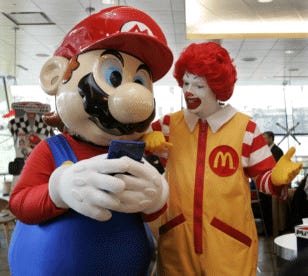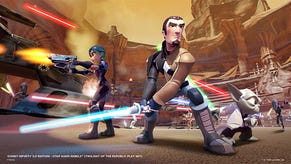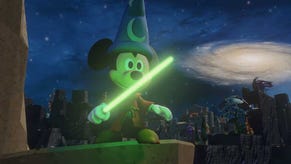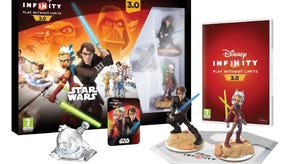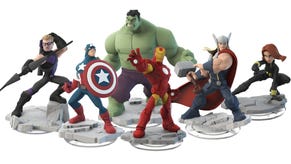Nintendo: no longer a leader, just a follower
Skylanders knock-offs and devices for emerging markets. Nintendo is now steps behind the competition, says Matt Martin.
"Nintendo is simply following the publishers, the console and mobile manufacturers, scrambling behind the bandwagon and struggling to keep up."
There was a time when Nintendo led the video game market. A time before the rise of mobile gaming and next-generation consoles. The Wii came along with an inventive, intuitive control scheme that had publishers creating whole new departments dedicated to it, while rival manufacturers struggled to catch up with their own motion control solutions.
Now Nintendo is simply following the publishers, the console and mobile manufacturers, scrambling behind the bandwagon and struggling to keep up.
Nintendo's latest ideas for innovation are two-fold; new hardware for emerging markets and a Skylanders-style NFC reader for figurines and games across the Wii U and 3DS. It will approach these new areas armed with it's considerable character IP. On the surface both ideas are sound and reassure investors that Nintendo is doing all it can to identify new areas of business. I have no doubt that Nintendo's characters are as beloved as they ever were. This week's biggest story on VG247 by a large margin has been the re-release/remakes of two old Pokemon games. But I question whose hearts those characters are so dear to.
Activision's Skylanders was the first real figure/video game success and the company has now sold over 175 million toys and generated $2 billion in sales - all from original IP. Disney's Infinity has got off to a flying start, lifting the company's long-suffering Interactive Division with its familiar characters. And it's only going to get better for Disney with the release of Marvel Super Heroes and presumably Star Wars sets in time for the new movies. That's a strong road map.
Nintendo has its work cut out for it if it hopes to grab a slice of a pie already being generously divided up by two companies. Of course Mario, Link, Kirby and friends are still popular - Nintendo has made a business of reusing its IP to create mega and meta games. Just look at Super Smash Bros. and Mario Kart, where characters from other games are spun-off into successful products in their own right. It doesn't get more self-referential that than.
"Your mum doesn't need a Wii remote to help her understand the fun of games anymore. It's not 2007. She probably spends more on Candy Crush than you do on Wii U games."
But there's no denying Nintendo is late to the party. And as fun as these hybrids of games and toys are, they will only have a finite shelf life enjoyed by a notoriously fickle audience of children. Trends change, novelty value runs dry, children move on to the next big thing remarkably quickly.
And then there's Iwata's idea of new hardware for emerging markets. Nintendo can source increasingly cheaper parts for its consoles, but it still needs to establish distribution, sales and localisation for wherever these emerging markets are. It's not easy, just ask Microsoft about its failed efforts with the Xbox business in Japan.
I would argue that the idea of "emerging" markets is already out of date. Where are you going to take these products? Brazil is thriving, dominated by free-to-play hits like League of Legends and a concerted push by Sony and Microsoft to establish a console presence. China emerged year's back and is in the business of expanding itself into the West. Taiwan, South Korea, India - all have rapidly growing local markets. And companies like Apple, Google and other tech firms are already heavily invested in them with cheaper products, hardware, games and mobile handsets.
Nintendo's problem is that it's too late to react. Following isn't necessarily a bad thing if you do what you do well, but the company doesn't have a great history in this respect. Its online presence isn't a patch on Steam, PSN or Xbox Live. Its Wii U tablet controller was released to punters who had already experienced the high build quality of the iPad. Once you've been wowed by that, it's difficult to go back. And its attitude to social issues is straight out of the 80s.
Never underestimate Nintendo, they say. Nintendo always has the ability to surprise, they say. All of which have been true in the past. But your mum doesn't need a Wii remote to help her understand the fun of games anymore. It's not 2007. She probably spends more on Candy Crush than you do on Wii U games. The battle to convince a mainstream audience that gaming is enjoyable and credible entertainment is over. There's no need for novelty hardware to explain it.
"Nintendo is a company that won't release Mario on mobile formats but gladly gives him up for the latest McDonalds Happy Meals."
And then there's Nintendo's attitude to its own brands, which it quite rightly protects as its crown jewels. But it needs to loosen the grip in the right places. This is a company that won't release Mario on mobile formats but gladly gives him up for the latest McDonalds Happy Meals. Because that's a quality brand Nintendo wants to be associated with? Nintendo, frankly, needs to get over itself. If it's not careful it will find itself in Atari territory, where reminiscing about the company and buying into the nostalgia is more important than innovation. T-shirts with cute logos on them become favoured over new games.
Iwata says he wants Nintendo to leverage its strengths. Its strengths are remaking its own IP, reusing its characters as assets, re-creating games that we already love. That's fine in principle, but it will never put the company at the forefront of the games business.
It will continue to be a follower if it does nothing more than regurgitate its own products on formats and in regions that have already been well proven, and where others have spent time and money building towards market dominance.
